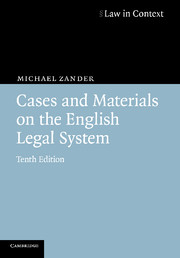Book contents
- Frontmatter
- Contents
- Preface to the tenth edition
- Preface to the First edition
- Acknowledgements
- Command papers, Hansard, House of Commons papers and other official publications excerpted
- Books, pamphlets, memoranda, speeches and articles excerpted
- Table of statutes
- Tables of cases
- CHAPTER 1 The organisation of trial courts
- CHAPTER 2 Pre-trial civil proceedings
- CHAPTER 3 Pre-trial criminal proceedings
- CHAPTER 4 The trial process
- CHAPTER 5 The jury
- CHAPTER 6 Costs and the funding of legal proceedings
- CHAPTER 7 Appeals
- CHAPTER 8 The legal profession
- Index
CHAPTER 5 - The jury
Published online by Cambridge University Press: 05 June 2012
- Frontmatter
- Contents
- Preface to the tenth edition
- Preface to the First edition
- Acknowledgements
- Command papers, Hansard, House of Commons papers and other official publications excerpted
- Books, pamphlets, memoranda, speeches and articles excerpted
- Table of statutes
- Tables of cases
- CHAPTER 1 The organisation of trial courts
- CHAPTER 2 Pre-trial civil proceedings
- CHAPTER 3 Pre-trial criminal proceedings
- CHAPTER 4 The trial process
- CHAPTER 5 The jury
- CHAPTER 6 Costs and the funding of legal proceedings
- CHAPTER 7 Appeals
- CHAPTER 8 The legal profession
- Index
Summary
The origins of the jury system
The original concept of the jury was precisely the opposite of what it later became. The members of the jury were chosen as persons who were likely to know what had happened or, if not, they were supposed to find out before the trial. In the thirteenth century it was ‘the duty of the jurors, so soon as they have been summoned, to make inquiries about the facts of which they will have to speak when they come before the court. They must collect testimony; they must weigh it and state the net result in a verdict’. Medieval juries came more to speak than to listen.
The transformation of the medieval active jury into the passive courtroom triers of fact is not well understood either in its timing or its causes. Probably in the later fifteenth century, but certainly by the sixteenth, it had become expected that the jury would be ignorant of the facts of the case.
Eligibility for jury service
Until 1974 eligibility for jury service was governed largely by wholly out-of-date property qualifications. This was the subject of inquiry by the Morris Committee, which reported in 1965 and whose report was implemented by the Juries Act 1974.
Composition of the jury list
Report of the (Morris) Departmental Committee on Jury Service, 1965, Cmnd. 2627, paras. 38–42
38. Under the present qualifications eligibility is in practice confined to ‘householders’. In general, this is taken to mean the person who is liable to pay the rates in respect of separately rated accommodation. […]
- Type
- Chapter
- Information
- Cases and Materials on the English Legal System , pp. 486 - 555Publisher: Cambridge University PressPrint publication year: 2007



